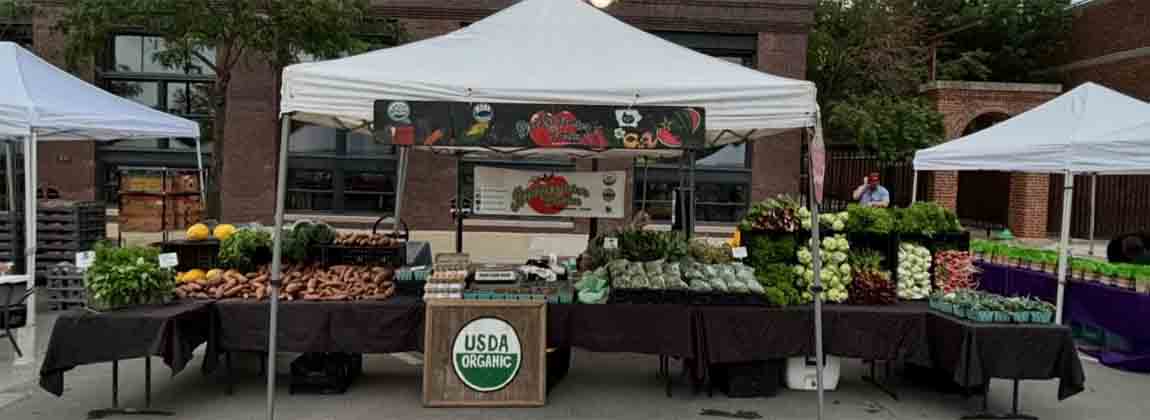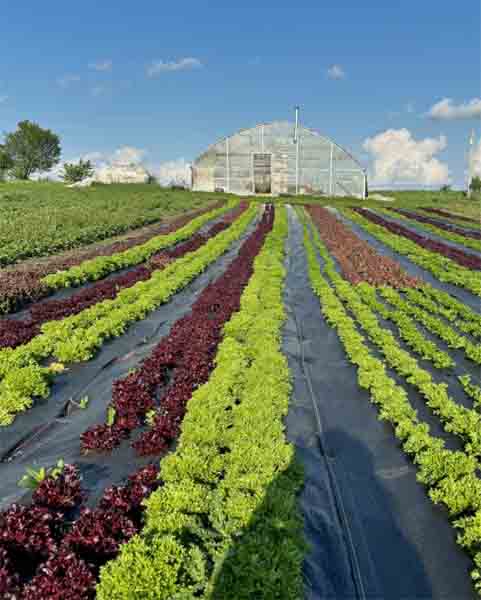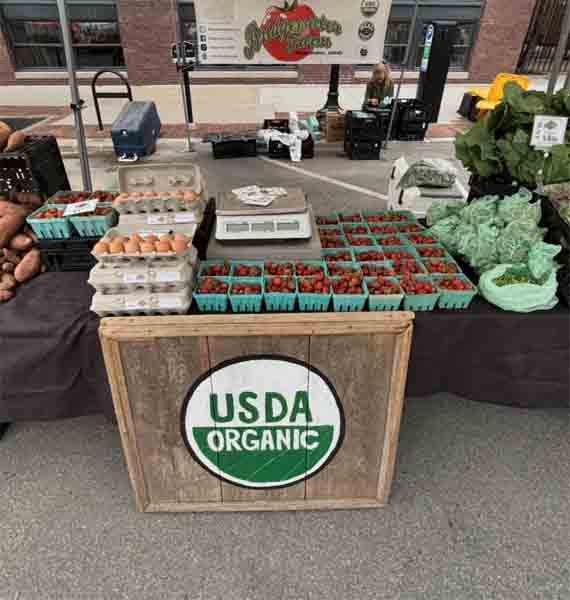Purchase Bridgewater Farm’s Organic Produce at This Summer’s Downtown Farmers’ Market

All images courtesy of the Bridgewater Farms Facebook page.
As you walk the booths along Court Avenue and Water Street, among others at the Downtown Farmers’ Market presented by UnityPoint Health – Des Moines each Saturday from May through October, don’t forget to seek out vendor Bridgewater Farm! This Adair County business offers organic produce along with all-natural meats, too, and they’ll be in Downtown Des Moines (DSM) for a collection of summer Market dates.
Bridgewater is a 40-acre fruit and vegetable farm that is certified organic and sells at multiple farmers’ markets in the area. Visit their booth and other Market vendors throughout the farmers’ market season! The updated vendor list is posted on the Downtown Farmers’ Market website each week.
Q+A with Bridgewater Farm
Tyler Raasch, whose father has farmed at Bridgewater since 1978, answer questions about Bridgewater’s booth at The Market, what makes the family business a success and more.
How long have you been a vendor at The Market?
Tyler Raasch: This is the sixth year at the Downtown Farmers’ Market. We try to grow the highest quality of foods that we can because there seems to be a lack of that in the grocery stores more and more every year. The demand for locally grown, high-quality, chemical-free organic produce is higher every year, and we’re trying to fill the gap.
What does Bridgewater Farm specialize in?
TR: Bridgewater Farm products are sold in Iowa and Nebraska. Everybody loves sweet corn and fruit. We grow a lot of strawberries, cherries, watermelon, cantaloupe … we’re working on our raspberry production. The highest demand we have at The Market is probably for heirloom tomatoes. Our cherry tomatoes and salad greens seem to do the best.
We do a CSA program of deliveries to 90 families every single week, so we do grow over 40 different fruits and vegetables for variety, but we tend to focus mostly on the stuff everyone really wants: tomatoes, sweet corn and fruit.

What is the CSA program?
TR: CSA stands for Community Supported Agriculture, and it’s a concept that started in Vermont and New Hampshire where they’re well-established with their growing regulations. They seem to have some good grassroots organizations to kind of protect the sovereignty of the people. There are a lot of small farms, and the land access is much easier, whereas here in the Midwest, things are kind of swayed the other way where there's a lot of larger farms, a lot of chemical companies and multinational corporations involved. So, the community supported agriculture to give the power back to the people.
CSA is when a farmer is planning their year in the spring, that farmer offers shares of all that they're going to grow throughout the year and the customer would pay upfront in February, March or April. Then we buy all our seeds and all the things that we would need so we don't have to go take out any operating loans from the bank. Its people supported … and then the farmer pays back the people throughout the year with every box, and usually, we try to always give more value than what they paid for compared to what they would get in the supermarket or at the farmers' market.
What is your favorite thing about being on-site at events like The Market?
TR: The farmers’ market is having your finger on the pulse. You can talk to people and see where the collective consciousness is at and how consumer opinion is being swayed through various trends. Attending markets helps you stay ahead of the curve on what people want and need and what’s going on in bigger industries.
The best thing has always been talking to people on a healing journey … people with illness / disease / cancer as they’re trying to find solutions to heal. Oftentimes, that’s through cutting out processed foods and incorporating more whole foods and simplifying the diet. We try to support those people as much as we can and help them get their health back.
The enthusiasm of all the people showing up bright and early to get the best produce always makes it worth it. Many people are thankful they'll bring us stuff they made like salsa, muffins, cake or cookies, all different recipes of things. A lot of the older ladies and gentlemen appreciate the garden and all the work that goes into it. It's always great to see how thankful they are. And for me, and I think for most of us at The Market, that's the most special part, just being able to do this for people who used to do it, but they just got too old, and they can't do it anymore. I always look forward to hearing people talk about what they're going to have for dinner. The food brings people together and that's the magic I see in it.
What advice do you have for others before they become a Market vendor?
TR: I would say doing the farmer's market is planting a tree. The best time to do it was 10 years ago, but the second-best time to do it is ASAP. The more people we have offering something to the community, the better the community is going to be. And a lot of people don't like the competition, but over the years it's become clear that the more variety, diversity and competition that we have, it creates more competition, which creates better quality and really makes everyone raise their own bar and meet higher standards. And so honestly, the more people that get involved, the better it is for everybody. So, I would encourage anybody just to try it.

And for anybody considering starting a farm or starting to sell at the farmers' market: the first year or two, it can be a little slower just getting your regulars and just getting the word out. But after that, honestly, it's like we don't spend any money on marketing or anything. It's just the word gets out after a while.
I would say just go for it. It's the best way to create your dreams and make your dreams come true. If you open a store like a brick-and-mortar, you must pay the deposit, rent or lease, all the equipment, it's a lot of upfront costs. And that's where a lot of people go wrong: they take on too much debt. But the farmers' market is a place where you can test the concept of your business, get feedback from the people and see instant results. Once you develop a certain following or a demand, you can get the confidence to take it to the next level. The farmers' market has always been the best way to start any business, in my opinion.
Any last thoughts?
TR: I guess an overarching message that if it could just get out to a general population would be that for a lot of kids or for people growing up, a lot of fruits and vegetables can be ruined by bad perception. You think that you don't like something because the quality wasn't good.
Maybe you ate it out of a can, or it was frozen and people just learn not to like certain things. But my message would be that if you come down to The Market and you try our stuff — a real tomato or fresh sweet corn that was picked in the last 24 hours or a freshly dug carrot or salad greens that were picked the day before — I guarantee that anybody could like any fruit or vegetable if they would just give it a chance. It would be nice to see more people open to just experimenting with fresh local food.
Learn more about Bridgewater Farm at bfproduce.com.
From May to October, experience local artists, live music and entertainment at the Downtown Farmers’ Market featuring more than 300 family farmers, bakers, artists and crafters from around the state. It’s easy to visit with plentiful and affordable street and ramp parking options. Find the latest updates for The Market each week on Facebook, Twitter and Instagram.
There are so many fun events specific to Downtown DSM. Attend annual events like the Downtown Des Moines Farmers’ Market, World Food & Music Festival and Holiday Promenade or find live music happening each week through the "Live Music This Week in DSM” blog series.
Elizabeth Weyers
Elizabeth Weyers is the Downtown Farmers’ Market Manager at the Greater Des Moines Partnership.